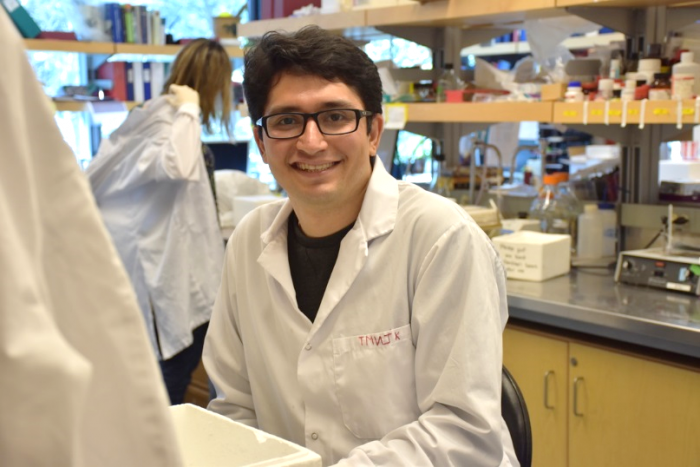 By Diana Canals, MSc Student in McNagny Lab
By Diana Canals, MSc Student in McNagny Lab
Mr. Farshad Babaeijandaghi, a graduate student in Dr. Fabio Rossi’s lab received the Vanier Canada Graduate Scholarship in the 2015 competition for his research on fibro-adipogenic progenitors (FAPs). Farshad’s career began in Iran, his home country, where he ranked within the top 50 among half a million people that participated in the National Entrance Exam for Universities and Colleges. This is a standardized test that is required to gain admission to higher education in Iran. As a result of his admirable ranking, he was able to enter the doctoral Medicine program at the most prestigious medical school in Iran – Tehran University of Medical Sciences – and he also received the Iran’s National Elites Foundation Scholarship award.

Farshad Babaeijandaghi
After completion of his doctorate degree in Medicine, Farshad started as a Post-MD research fellow at the Stem Cell Technology Research Center in Tehran. There he developed nanofiber wound dressings to accelerate the wound-healing process. During this time, he also published his first paper on the usage of biocompatible polyethersulfone (PES) nanofibers to accelerate epidermal regeneration (Babaeijandaghi F et al, 2010).
In 2013, Farshad was admitted to the Ph.D. program on Experimental Medicine at UBC under the supervision of Dr. Rossi, where he studies the role of a subset of inflammatory cells in muscle regeneration and fibrosis.
At Dr. Rossi’s lab, Farshad has engaged in many collaborations, one of which lead to a manuscript that was recently published in Nature Medicine (Lemos, D.R et al., 2015). This paper highlighted that nilotinib, a small tyrosine kinase inhibitor approved for the treatment of imatinib-resistant chronic myelogenous leukemia, could reduce muscle fibrosis by promoting TNF-mediated apoptosis of FAPs. Farshad was awarded with the Four Year Doctoral Fellowship (4YF) for his work in 2014.
Now, Farshad Babaeijandaghi’s research is focused on the role of a specific subset of inflammatory cells on modulating FAPs. FAPs are crucial in the response to muscle damage and regeneration. In healthy muscle, FAP expansion is transient and after regeneration there is a rapid reduction of their numbers. However, in conditions favouring degeneration, FAPs persist in the tissue resulting prolonged matrix deposition and fibrosis. Farshad’s research focuses on the characterization of the subsets of inflammatory cells that control FAP numbers and, therefore, are involved in muscle regeneration and fibrosis.


